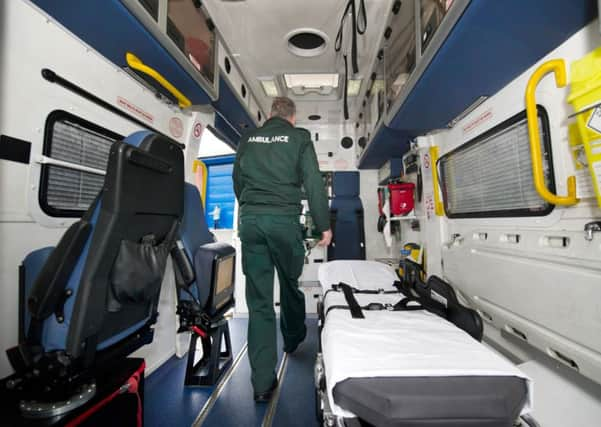Sickness soars as ambulance staff are ‘run ragged’


A report before the Scottish Ambulance Service (SAS) board this week revealed a 7 per cent absence rate, compared to the 5 per cent average across NHS Scotland, and the UK private sector mean of 1.8 per cent.
The levels were branded “unacceptably high” by Conservative health spokesman Jackson Carlaw, who called for ministers to intervene to help the struggling service.
Advertisement
Hide AdAdvertisement
Hide AdMr Carlaw MSP said: “Taxpayers and patients will be mortified at these tens of thousands of hours lost each month as a direct result of people being off sick.
“Not only does it have a financial consequence, it clearly puts immense strain on the staff who are left to get on with what is a tough and thankless job.
“And all of that risks a poorer quality of service for patients, some of whose lives depend on ambulances.”
These figures, which are the highest since recording began in 2005, show the SAS is struggling to meet its own target of five per cent.
Last year the ambulance service reported a sickness rate of more than 6 per cent, while in 2013 the figure was 6.5 per cent.
Earlier this year, it emerged bosses were even considering setting up a dedicated absence hotline just to deal with staff phoning in sick.
A paramedic, who wished to remain anonymous, told The Scotsman that staff were being “run ragged” due to the unsustainable workload.
He said: “We simply haven’t got the resources. Staff are doing eight-hour, 12-hour shifts without breaks. We are getting regularly called to things which aren’t even emergencies. I had one where a woman had a cut toe. Morale is so low its unbelievable.”
Advertisement
Hide AdAdvertisement
Hide AdUnion bosses said increased resources have not matched spiralling workloads, with a rise in attacks on ambulance crews adding to the problem.
David Forbes, Unison regional organiser, said: “All this adds to stress and impacts on the general health of the workforce. Working as part of an ambulance crew or in the ambulance control rooms is a not an easy job, and you have to be at your best to do the job properly.
“Unison has been calling on the Scottish Government to increase resources in the ambulance service for some time.”
Ministers have increased resources during the past two financial years to support the service, said health secretary Shona Robison.
Ms Robison said: “We value the dedication of our ambulance workers extremely highly. They provide a first class service, often under challenging and physically demanding circumstances, and we are determined to support them to do so.
“Ambulance service managers are working closely with trade union partners and staff to develop strategies to promote health and wellbeing – including fast track physiotherapy and support services, and self-referral to occupational health. These arrangements are monitored and reviewed.”